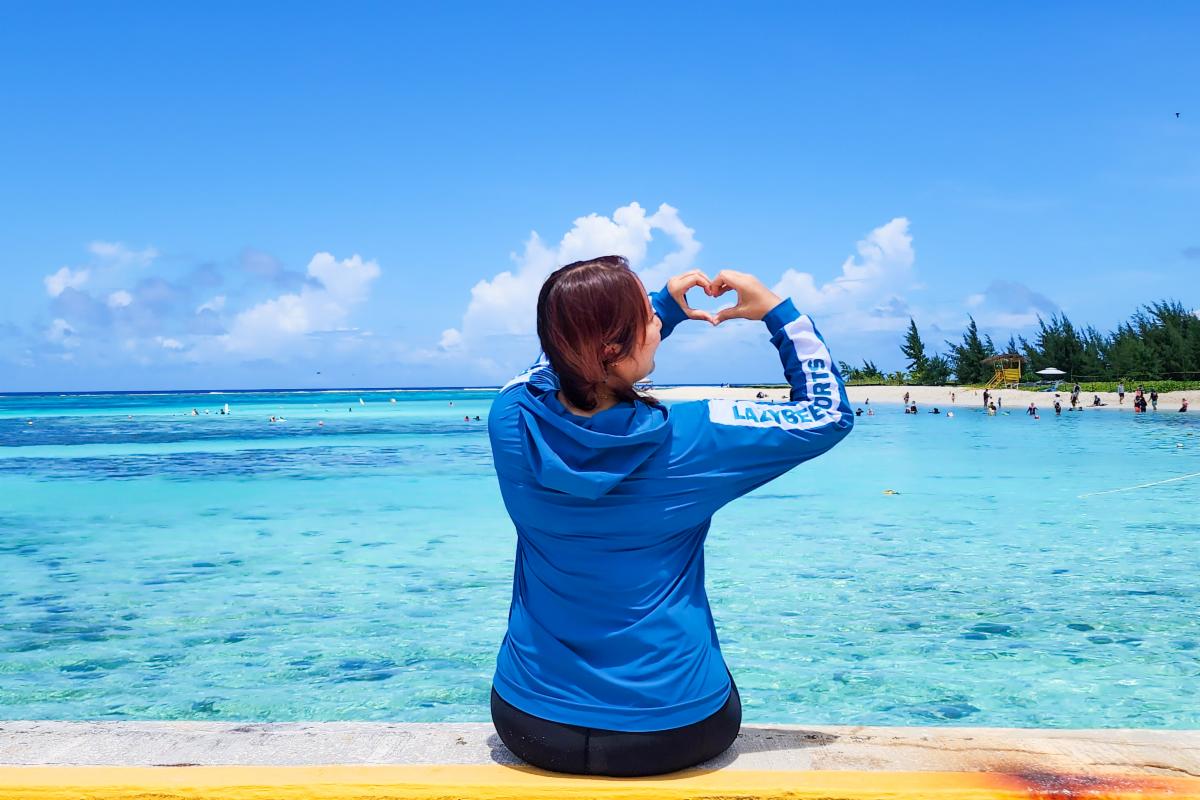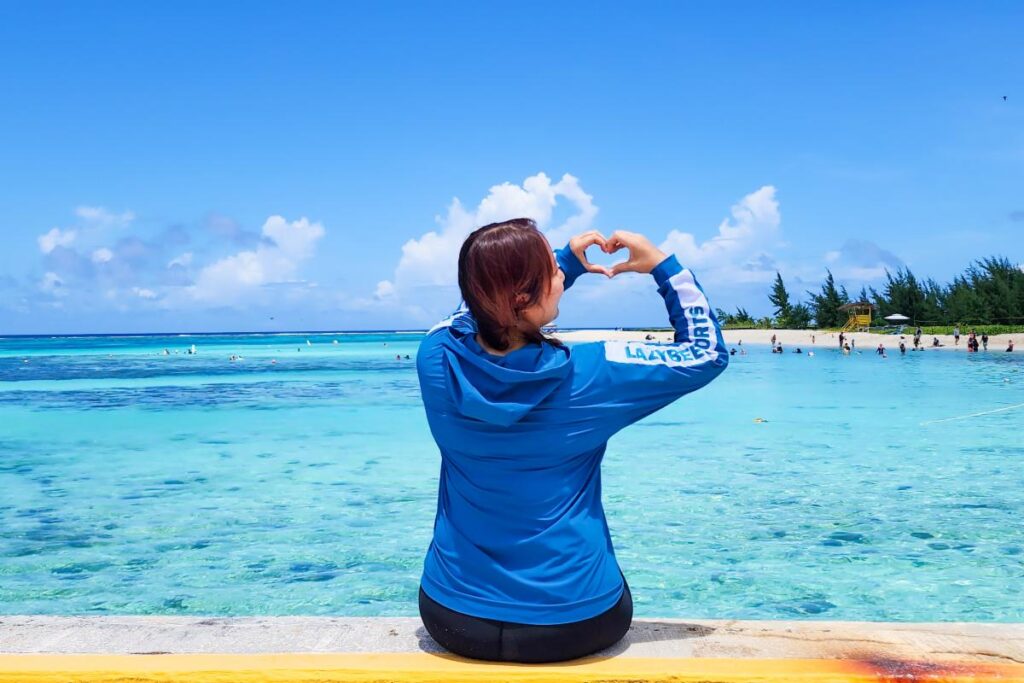
A South Korean tourist at the Managaha Marine Conservation Area of Saipan.
“THE Department of Public Lands baited us with the proposed exclusive rights use to sign the Managaha Island Master Concession Operator Agreement,” Marianas Global Incorporated said in a three-page statement on Thursday.
“We came to Managaha with big hope and vision in August 2023. We had plans to turn the island into the world’s most premier marine resort and prepared our operations to reflect such top-end services by purchasing submarines, various equipment, facilities, and upscale speedboats. However, various complex administrative regulations and permit conditions and processes kept most of these investments on hold before we can start to implement them … for more than a year. Additionally, we have invested $3 million over the past year to repair and replace outdated electrical and water supply facilities and restrooms, and another $3 million on over 20-year-old facility renovations that [will take] another 1 to 2 years of work to be completed to meet the global standard,” stated MGI, a Korean-based company.
DPL has given MGI until Oct. 26 to vacate the exclusive concession area on Managaha, or within 15 days of the termination notice issued to MGI on Oct. 11.
The notice of termination was issued by DPL for MGI’s “failure to cure” violations of the Managaha Island Master Concession Operator Agreement “within 30 days.”
DPL said MGI has not paid rent in the amount of $800,000 plus interest of $12,000, for a total of $812,000.
According to MGI, the root cause of the contract termination is the “Uses and Privileges” clause in the agreement.
MGI said two main provisions of the contract are 1) exclusive rights to marine sports; and 2) rental of equipment and food and beverage sales in the exclusive concession area.
“In our one year of operation, we found that DPL effectively has no authority to grant the exclusive rights,” MGI said. “In other words, DPL has given us exclusive rights to marine sports that it does not own. This constitutes fraud. All operators who receive permits from [the Division of Fish and Wildlife] and/or [Coastal Resources Management] can conduct marine sports, and all businesses are freely selling their services on the island. Further, not only did DPL fail to uphold the exclusive rights promised to us in the contract, but they sided with the local vendors in protecting their interests instead of enforcing the contract terms,” MGI added.
As for renting equipment and food and beverage sales, MGI said, “Most tourists rent equipment from outside or bring food or lunch boxes and drinks onto the island. We could not regulate what equipment or foods and beverages were brought onto the island from outside. External operators/local vendors even accompanied DPL staff to protect their customers and obstructed our staff from enforcing our exclusive rights, therefore, these local vendors’ efforts coordinated with DPL staff effectively negated any exclusivities it promised under the agreement.”
MGI said DPL proposed the “exclusive rights” at the outset as an “attractive bait to ultimately impose much greater obligations on the concessionaire.”
“With this understanding, we offered to pay excessive rent and various donations to the local community by having the exclusivity granted to us in the contract. However, without the exclusivity in the actual commercial practice thus far, the annual revenue is about $500,000 whereas the rent, island maintenance and insurances, and community donations have cost us over $2 million a year,” MGI said.
“This non-exclusivity forced us to compete in a fiercely competitive market at a huge disadvantage. We had to bear the $200,000 a month for island maintenance and rent that goes into our product pricing whereas the local vendors, our competition in this case, enjoyed our island management services for completely free while competing against us. This will obviously put us into a perpetual loss situation for any products or services that we may offer in this disadvantageous condition. After many discussions, DPL concurred on the need to clarify the exclusivity to strengthen the concessionaire’s position to resolve these problems. As such, DPL initiated the regulations amendment effort and went through the hearing process in August. However, they faced loud unilateral opposition from the local vendors and residents who did not know or understand the contract terms (exclusivity) and our true business directions and intentions,” MGI said.
“We had already committed to offer significant benefits to the local community while the greater benefit was to beautify the island devastated by the pandemic [and transform it into] an upscale resort setting to earn higher revenue, and then give it back to the community. The Managaha island is not robust enough to have too many competitors. Currently, there are only about 3 to 4 operators on the island. Instead of competition, we took a mutually beneficial approach by creating a symbiosis atmosphere with DPL and the local vendors. We suggested sharing the revenue and the costs of maintaining the island among all businesses that generate revenue from the island. Our proposal did not come just to reduce our burden. The truth is that the local vendors were and still are using cheap equipment, outdated and rather dangerous boats to provide low-quality services to consumers at the lowest prices possible. Our hope and intention were to rebrand the island by offering high-quality equipment and facilities, a beautified island, with global standard [for] safety, electricity, and water supply,” MGI said.
“Unlike Vietnam and the rest of Southeast Asia who are successfully recovering by reshaping themselves in their newly renovated forms after the pandemic, Managaha would now revert back to be perceived as a ‘low-quality’ tourist destination much to our dismay with the termination of our contract,” MGI added.
In a nutshell, MGI stated, “DPL proposed exclusivity as a bait to us, and we proposed a business sharing model to be mutually beneficial for all parties involved. We wanted to install a systematic approach to manage price, quality, and orderly competition while sharing the revenue and the costs of operating the island.”
“However, DPL didn’t seem to comprehend this approach and rejected it with a notification of the contract termination. Unfortunately, Managaha would now revert back to the past where the existing 3 to 4 local businesses would continue to provide low-quality services using cheap equipment and dangerous boats to ultimately solidify the island as another low-quality site to visit. This also includes the loss of all of the benefits we have provided or promised to provide to the local community. At the end of [the] day, if DPL does not adopt the regulation amendment, there will be absolutely no operators/investors willing to endure monthly losses of $300,000 to be a concessionaire.”
According to MGI, they entered the bidding process “because [the] CNMI is a U.S. Commonwealth where the fair standards of the U.S. federal laws and commercial practices apply…. But ultimately, we have been defrauded by the contract with the impractical exclusivities that DPL granted to the concessionaire. While we see that DPL’s ill-fated commitment to the grant of exclusivity was not intentional to be false or invalid since they recently went through the regulations amendment effort before stalling to adopt it, the order of their action was completely wrong! It would have been so much better to amend their regulation and adopt it first prior to offering bids to the potential concessionaire with the true and valid exclusivity that now merits a [revenue- and cost-sharing model] to be fair to all parties involved.”
MGI said it is “not just an operator. We are an investment company operating hundreds of millions of dollars and have consigned our marketing efforts to McCann Erickson, a world-renowned advertising and marketing company, for millions of dollars for this project. Our offer was to return much of our profits to the infrastructure development of Saipan. We came here with a big picture and vision to rebrand the entire Saipan’s image by initiating key infrastructure investments in Saipan. We wanted to rebrand the island into an upscale and luxurious setting to ultimately target the very lucrative niche market that comes with the high-end premium customers who wouldn’t mind dropping several hundred thousand dollars in their visit for the benefit of elegant and pleasure-loving style of refined services.”
MGI said it believes that “the tourist market winner will be determined by whoever wins the improvement race to successfully renovate … broken and neglected infrastructure and facilities first after the pandemic.”
“Our prediction was very accurate,” MGI added, “as we witness … Southeast Asia, including Vietnam, now overflowing with Korean tourists while Saipan is seriously lagging behind and simply ignored by these Korean and Chinese tourists because we can … offer Saipan-bound customers only with …low-end products and services with outdated infrastructure that are topped with lack of entertainment options. This is why Saipan needs to seriously think about rebranding itself to withstand the global tourist market competition and we were here to achieve this feat together. However, it is painful to see that our investment and our big vision in this good faith effort has ended in failure because we could not deliver this message loud and clear enough to be the pioneer to rebrand this beautiful island.”
Variety was unable to get a comment from DPL.
In an interview on Tuesday, Gov. Arnold I. Palacios said, “no company in its right mind” would have signed the MGI-DPL agreement.











